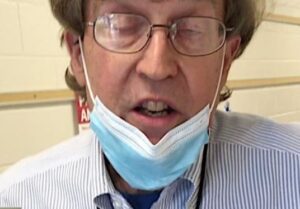by James A. Bacon
On June 8, Rob Schilling walked into the Woodbrook precinct of Albemarle County to cast a vote in the Democratic Party primary. A talk show host on WINA radio, he was well-known locally as a conservative — there aren’t many in the area, so he stands out — but under Virginia law he has the right to vote in any primary he chooses. More problematic, he wasn’t wearing a mask.
Local poll worker Leo Mallek, who was wearing a blue surgical mask, stopped Schilling in the corridor leading to the room with the voting machines and told him to cover his face. Schilling refused and tried to enter the room to vote. One poll worker attempted to physically block him and grabbed his arm; another touched his shoulder to guide him out of the voting area. After a dispute lasting roughly four minutes, Schilling was allowed to vote.
On June 21, he filed a lawsuit against the poll workers and Albemarle County Registrar Jake Washburn alleging assault, battery and the violation of his voting rights. “What happened to me was beyond atrocious,” said Schilling in a press release. “Albemarle County voters should never face intimidation, harassment, and physical assault by elections officials when attempting to cast a ballot. These egregious violations of my rights, all captured on video, must be legally rectified.”
Initially, I hesitated to write about the incident. At the end of the day, Schilling was allowed to vote without a mask, and the hassle caused by the poll workers detained him all of four minutes. I’ve spent longer waiting for poll workers to check my voter ID. But in the end I decided Schilling’s experience was worth writing about. The General Assembly has enacted a slew of new voting laws, effective July 1, on the premise that Virginia’s voting rules “suppress” voting. New laws include making it easier for people to vote by absentee ballot, letting people vote early in person, providing curbside voting for people with disabilities, and banning the carrying of firearms within 40 feet of a polling place.
How is it not also “voter suppression” if poll workers hassle people who tried to vote without a mask?
Schilling says his was not an isolated incident. He has been been contacted by at least four other individuals who recounted similar difficulties. You can access a copy of the lawsuit and a video recording of the incident on his website.
On May 29, 2020, Governor Ralph Northam issued the so-called “mask mandate.” The executive order included numerous exceptions, including for medical conditions. The order prohibited people from being required to provide proof of a medical condition in order to obtain the mask exemption.
Almost one year later, May 1, 2021, Northam ended the mask mandate for vaccinated individuals, changing the requirement to wear a mask in public places to a mere recommendation.
Prior to election day, Schilling says, he wrote Washburne, the county registrar, who confirmed that masks were not required in order to vote in Albemarle County.
On election day, Schilling entered the Woodmark precinct, where he was met by Mallek, the Chief Officer of Election. Mallek told Schilling he had to wear a mask.
“I’m not wearing a mask,” Schilling replied. “I’m here to vote today, and I’m not wearing a mask. I have an exemption from the governor.”
Mallek started speaking, then Schilling said, “I’m going to record you, and I’m going to play it back for people who make the policy.” (The recording can be viewed here.)
The camera veered away briefly, and Mallek either dropped his mask to expose his nose and mouth, or the mask fell unintentionally.
A poll worker told Schilling he had the option of voting outside. Schilling replied, “You can’t block me from voting. Take your hands off me. Call the police.”
When Schilling attempted to walk around a poll worker, identified as John Doe #1, the poll worker “stepped in front of Mr. Schilling while he was in motion, causing bodily contact. John Doe #1 then grabbed Mr. Schilling’s arm and/or shoulder.”
Schilling exclaimed, “You cannot block me from voting! Take your hands off me.”
When he entered the voting area, someone told Schilling, “Sir, this is not our policy. This is the school policy.”
“I’m not going outside,” Schilling said. “You can’t tell me I can’t vote. … I don’t want to vote outside. I want to vote right here.”
Another poll worker, identified as John Doe #2, put his hand on Schilling’s shoulder and told him, “Come with me. We’re going outside.” Schilling did not comply, and the individual did not press the matter.
Someone told Schilling he could “vote outside.” He replied, “You can’t tell me I can’t vote. … I don’t want to vote outside. I want to vote right here.”
A couple of minutes passed as a poll worker tried to reach Washburne on the phone. The registrar confirmed that Schilling was indeed allowed to vote. Schilling asked to sign a voter confirmation statement. After that, he proceeded to vote normally. He thanked the poll workers and left.
The video recording shows nothing resembling physical coercion in the encounter. But the lawsuit interpreted the physical contact ominously:
The willingness of Defendant Mallek, John Doe #1, and John Doe #2 to make close bodily contact with Mr. Schilling in a purported and/or ostensible effort to ensure safety of Mr. Schilling and others from a viral disease underscores and gives rise to the inference that the true purpose of the defendants was not to protect the Woodbrook Precinct and its visitors from an outbreak, but was instead to intimidate Mr. Schilling in the exercise of his franchise on the day of the Democratic Party’s primary election.
Bacons’ bottom line: I’ll be honest, this is thin gruel if you’re looking for a dramatic instance of voter suppression. Voter hassling might be a fair term. It is also clear that Schilling, by videotaping the encounter, came prepared for a confrontation. Still, Schilling has the following facts in his favor.
- Northam’s executive order did end the mask mandate for vaccinated people. (The lawsuit did not reveal whether Schilling was vaccinated or not.)
- Schilling did check with the registrar to confirm that he could vote without wearing a mask.
- A poll worker did confirm Schilling’s assertion in a phone call to the registrar.
On the other hand, Albemarle County made provisions for unmasked people to vote outside. Rather than follow the path of least resistance — he wanted to slide his ballot into the machine himself to ensure that it was counted, he told Bacon’s Rebellion — Schilling persisted in his determination to vote indoors. Clearly, his actions were designed to make a political point. But, then, there’s no law against that. Voter “suppression,” one might conclude, is in the eye of the beholder.




